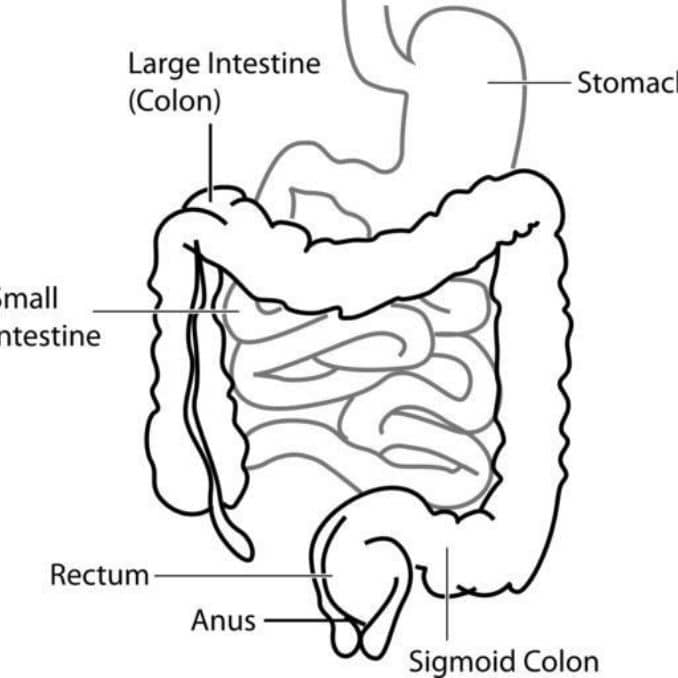
The Lowdown on Leaky Gut: Do you suffer from chronic fatigue? Do you often have digestion problems like diarrhea or constipation? Have food allergies affected you more than usual lately, or are you at risk for diabetes?
All these conditions and more may be linked to a “leaky gut.” But so far, the medical profession doesn’t acknowledge this as a “real” condition.
How Does Gut Work When It’s Healthy?
Simply put, a leaky gut is an unhealthy gut. It means that something’s gone wrong with how the intestines work, so let’s look at how they operate when they’re healthy.
The Lowdown on Leaky Gut: Imagine your intestines (or bowels) as a series of tubes that snake back and forth between your stomach and your anus. These tubes are muscular, which means they can contract and expand, taking the food partially digested in the stomach and moving it down the line.
Most of the time, when we think of tubes like the intestines, we imagine that they’re airtight like hoses, carrying nutrients and waste from one place to another.
But the intestines are more dynamic than that. They absorb sugars, amino acids, fatty acids, vitamins, minerals, salts, water, and other good things from the foods we eat and the beverages we drink and then allow those nutrients to enter the bloodstream, where they can be delivered to other cells in the body.
At the same time, they separate the waste, refusing to allow its passage to the bloodstream and pushing it onward so it can be excreted through the urine and feces.
The Digestive System
The Lowdown on Leaky Gut: Most of the nutrient-absorbing process occurs in the “small intestine,” which is attached to the stomach. The “large intestine,” which connects the end of the small intestine to the anus, is tasked mostly with pushing waste materials out of the body.
Each intestinal tube is lined with millions of cells, and these cells join together to create a tight barrier that serves as the intestines’ security system — allowing the good stuff through while keeping the bad stuff trapped inside.
Scientists used to believe that the cells lining the intestine were fused. However, in the 1970s and after that, they discovered that the spacing between the cells was more dynamic than they thought. The junctions between the cells can contract and expand for a natural give-and-take within the intestine.
Rather than serving as a barrier, the intestine’s lining acts more like a doorway, opening, and closing consistently depending on what needs to go through to the bloodstream and what needs to remain trapped. The gut allows water and nutrients to pass through while retaining harmful antigens, microorganisms, and waste products.
This is how the gut functions when it’s healthy. Under certain conditions, however, things can change.
What Is a Leaky Gut?
In a leaky gut (also called “increased intestinal permeability”), those junctions between cells start to malfunction. Instead of opening and closing the door as needed, they leave the door open when they shouldn’t, allowing some of the bad stuff through to the bloodstream, where it can move to other areas of the body and potentially cause harm.
“Leaky gut syndrome” is not recognized by the established medical community, and it’s not listed as an official disease. There is evidence, however, that the intestinal lining can become increasingly porous, allowing potentially harmful organisms to enter the bloodstream. What scientists aren’t clear on yet is exactly what the consequences might be when this happens.
Information on the internet may lead one to believe that the instant the intestines start opening their doors more often than normal, all havoc ensues, but that’s not necessarily true. The body’s immune system is already equipped to deal with increased intestinal permeability and tends to go to work, eradicating any escaped toxins.
In one study, for instance, researchers found that some people with leaky gut were completely healthy. In an overall healthy person, a leaky gut may not cause any major problems. But there is evidence of other times when it can lead to serious health issues.
Diseases Linked With Leaky Gut
Currently, most scientists and doctors agree that diseases like the following are linked to a leaky gut:
- Inflammatory bowel disease (IBD), like Crohn’s disease and ulcerative colitis
- Irritable bowel syndrome (IBS)
- Celiac disease
- Diabetes
- Food allergies
The Lowdown on Leaky Gut: How these conditions may be linked is still not completely clear, but there are indications that inflammation is involved. As the intestines become more permeable, allowing toxins into the lining and through to the bloodstream, the immune system mounts a battle against those toxins, and inflammation takes hold. All of the conditions above are known to involve intestinal inflammation.
Think about when you cut yourself. The area becomes red and swollen. That’s a visible sign that your immune cells have moved in and are working to kill invaders like bacteria and viruses while promoting healing.
The same thing can happen in the gut when toxins start leaking into the intestinal lining. As their presence increases, the immune system goes to work to get rid of them, and that causes that same sort of swelling and redness. The intestines become inflamed, leading to IBD, IBS, and other similar conditions.
Unraveling the Link Between Leaky Gut, Inflammation, and Disease
The Lowdown on Leaky Gut: Inflammation caused by a leaky gut has also been tied to insulin resistance, which increases the risk of diabetes. In a recent 2019 study, scientists discovered that in obese individuals, the immune system battles against bacteria leaking through the intestinal tissue, resulting in inflammation. In turn, that inflammation can induce insulin resistance—affecting insulin’s ability to do its job and increasing the risk of diabetes.
Studies evaluating food allergies have also found that intestinal permeability could be a factor. Patients with food allergies had their intestines evaluated in one small study, for example, and results showed that impaired intestinal permeability was present in all of them.
However, how gut permeability and other factors interact to create disease is still unclear. What happens first? Does leaky gut cause inflammation and lead to disease, or was the inflammation there already, leading to leaky gut and disease?
In other words, does a leaky gut cause disease, or is it simply a symptom of a disease? Some studies indicate that it may cause diabetes and IBS. However, in conditions like celiac disease, for instance, it’s the gluten that causes the leaky gut. Once gluten is eliminated, the gut can repair itself and return to normal.
We need more studies to figure everything out. Meanwhile, it’s important not to oversimplify what’s going on if we are to figure out exactly how to address it.
Does Leaky Gut Cause Autism and Other Conditions?
Outside of the conditions listed above, we don’t have enough evidence to confirm that a leaky gut causes any of the following conditions:
- Autism
- Anxiety
- Cancer
- Depression
- Eczema
- Headaches
- Fatigue
- Fibromyalgia
Studies are proving that leaky gut is not the cause of some of these conditions, while others have produced mixed results. Because of this, it’s important to be cautious before spending money on supplements, diets, or other remedies sold to treat leaky gut, particularly because these treatments have little scientific evidence behind them showing that they work.
What Causes Leaky Gut?
So far, no one is sure what causes a leaky gut. There are many possibilities, including the following:
- A genetic mutation: Some studies have found that certain individuals may be more genetically susceptible to the leaky gut than others.
- Gluten: In people with celiac disease or who are sensitive to gluten, gluten may increase intestinal permeability.
- Chronic inflammation: If chronic inflammation is already present, it can damage the intestines enough to cause a leaky gut.
- Unhealthy microbiome: If the balance of good and bad bacteria in the gut is upset to the point that the bad bacteria become plentiful, they can damage the intestinal wall and lead to a leaky gut.
- Nonsteroidal anti-inflammatory drugs (NSAIDs): Some studies indicate that long-term use of NSAIDs like ibuprofen and aspirin may increase intestinal permeability.
- Excessive alcohol intake: Alcohol abuse can damage the intestinal wall, leading to a leaky gut.
- Nutrient deficiencies: Those who don’t get enough vitamin A, vitamin D, and zinc may be at a higher risk for intestinal permeability.
- High sugar intake: An excess of sugar in the diet, particularly fructose, may harm the intestinal wall.
- Stress: Some studies have indicated that chronic stress can affect the digestive tract negatively, potentially resulting in a leaky gut.
- Chemotherapy: Some chemotherapy treatments for cancer can damage the intestinal lining, increasing permeability.
- Infections: Infections that take hold in the intestines, like salmonella and giardiasis, can damage the intestinal wall.
Symptoms of a Leaky Gut
As noted, leaky gut is not yet a defined medical condition, so there are no official symptoms. Nevertheless, people may associate the following symptoms with a leaky gut:
- Digestive issues (constipation, diarrhea, bloating)
- Widespread inflammation
- Food allergies or food intolerances
- Headaches
- Brain fog
- Fatigue
- Skin rashes
- Joint aches and pains
- Muscle aches and pains
- Mood swings, nervousness
- Recurrent bladder or vaginal infections
The Lowdown on Leaky Gut: Medical experts don’t connect these symptoms with leaky gut syndrome because they don’t have the evidence that they need to do that yet and because so many other conditions can cause these symptoms.
If you suspect you have a leaky gut, talk to your doctor. Although there are no tests that can reliably determine if you have it, there is one test that measures levels of two sugars — mannitol and lactulose — in the urine. Mannitol is absorbed easily in those with healthy intestines, and lactulose is only absorbed slightly.
Many physicians won’t use this test because it’s considered unreliable, but it can show how much of these sugars are absorbed in the body. If the test shows a high level of mannitol and a low level of lactulose, it is supposed to indicate a healthy intestinal wall. If both levels are high, it “may” indicate a leaky gut.
How to Improve Intestinal Health
The Lowdown on Leaky Guta: Treating a leaky gut can involve some trial and error. First, check with your doctor to be sure that another condition — such as celiac disease, diabetes, or food allergies — isn’t involved. Treating these conditions can help treat your gut as well.
Next, start by looking at your diet and eliminating any known causes of inflammation. Try:
- Limiting alcohol intake
- Cutting back on sugars and simple carbohydrates like white bread, white pasta, white rice, cookies, cakes, and doughnuts
- Limiting processed meats like cold cuts, deli meats, bacon, and hot dogs
- Reducing the intake of processed foods
- Avoiding fried and fast foods
- Avoiding any foods that you may be sensitive to if you have celiac disease or food allergies
- Avoiding added sugars and artificial sweeteners
Then, step up your intake of gut-healthy items, including:
- High-fiber foods like vegetables, beans and legumes, and whole grains
- Probiotic-rich foods like yogurt, kombucha, miso, tempeh, and sauerkraut
- Foods rich in omega-3 fatty acids, which help combat inflammation, like fatty fish, walnuts, flaxseed, olive oil, and fish oil supplements
Finally, consider taking these extra steps:
- Take a probiotic supplement to help balance the gut’s microbiome
- Limit your use of NSAIDs
- Manage your stress better through daily activities like meditation, exercise, tai chi, yoga, pet therapy, art therapy, and more.
- Consider herbal supplements known to support a healthy gut, including glutamine, licorice root, turmeric, zinc, pancreatic enzymes ― if you need help digesting foods ― N-acetyl glucosamine, slippery elm, cat’s claw, quercetin, and marshmallow root.
Good bowel health is essential for good overall health. So check out now this Master Guide to Better Bowel!





